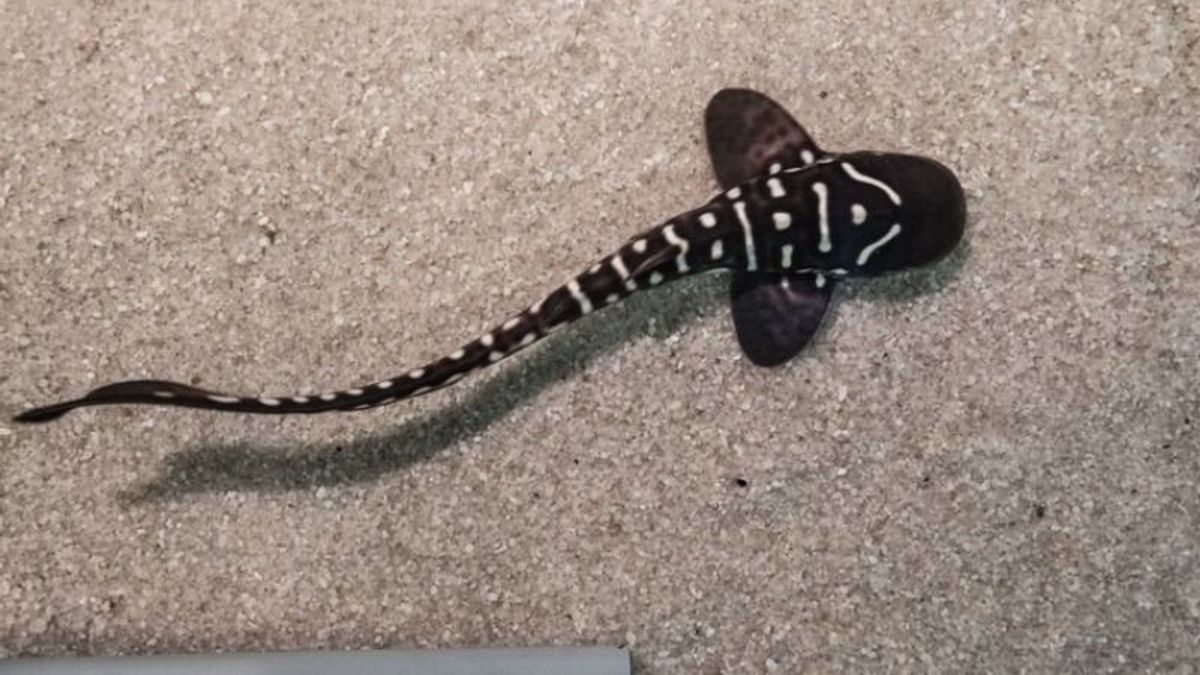PAPUA - The Regional Innovation Research Agency (BRIDA) of West Papua Province reported that three young belimbing sharks had been released separately in the waters of Laguna Wayag, Raja Ampat, Southwest Papua.
Head of West Papua BRIDA Charlie D Heatubun said that the release of the three belimbing sharks was a major achievement of the implementation of the StAR Project (Stegostoma tigrinum Augmentation and Recovery) which was developed for three years.
"The three young belimbing sharks released were Audrey, Kathyn and Charlie," Heatubun said in a written statement received in Manokwari, Antara, Sunday, March 19.
Before being released into the wild, the three were still in the form of eggs flown from the SEA LIFE Sydney Aquarium in Australia on August 5, 2022 and kept with other eggs at the Raja Ampat Research and Conservation Center (RARC).
There were two sharks released on January 13, 2023, which were attended by various partners in the work group of the Indonesian StAR Project and the Kawe indigenous people.
"The release of the first two young sharks, namely Charlie and Kathyn, then on February 13, we released another one," he added.
The StAR project works to realize a species conservation program using the egg translocation method and breeding of belimbing sharks in Raja Ampat waters.
The program combines the success of belimbing shark breeding in aquariums with efforts to protect and preserve belimbing sharks in their habitat.
So far, he said, there have been three shipments of belimbing eggs from the SEA LIFE Sydney Aquarium Australia, Shark Reef Aquarium in Mandalay Bay, and the Las Vegas Aquarium United States.
Of the eight embryo eggs at the RARCC and Misool Ecoresort breeding sites, five eggs have been hatched into breeds of belimbing sharks.
"Three of them are Audrey, Kathyn, and Charlie," said Heatubun as well as the Head of the StAR Project Implementation Coordination Team in West Papua.
He continued that the success of translocation and restocking of belimbing sharks was the success of efforts to conserve the endangered charismatic fish species in the waters of Southwest Papua.
Since hatching, he said, the three young belimbing sharks have shown a fairly healthy growth rate and development when treated for approximately 14 weeks at the RARC breeding ground.
His party continues to monitor the development of the three young belimbing sharks that have just been released into the waters of Laguna Wayag.
This effort gives great hope to the preservation of biodiversity in Southwest Papua. "At the same time, it has an impact on tourism development to support sustainable development in the Land of Papua," said Heatubun.
Vice President of Marine Asia-Pacific Conservation International Mark Erdmann said the rate of determination of belimbing shark eggs reached 62.5 percent and the development of belimbing sharks 2.5 percent faster when they were in captivity facilitation than in aquariums.
"It is possible that the temperature of the breeding location is higher, the availability of live feed, and the circulation of the open sea water system," he said.
Before being released into the wild, said Mark, the length of the belimbing shark was 70 centimeters with a body weight above 800 grams, so it had met the standard size proposed by The International Union for Conservation of Nature (IUCN) Conservation Planning Specialist Group.
According to him, the StAR Project is in the best category, because three belimbing sharks were successfully released into the wild and later two more will follow.
The selection of the Wayag Lagoon as a release location is due to being included in the conservation area of the Waigeo Islands, as well as part of the Raja Ampat Geopark set by the United Nations Educational, Science and Culture Organization (UNESCO).
“ Scientifically, it has been confirmed as the location for the world's first Manta (Manta Bureautris, Red) session,” he also said.
The English, Chinese, Japanese, Arabic, and French versions are automatically generated by the AI. So there may still be inaccuracies in translating, please always see Indonesian as our main language. (system supported by DigitalSiber.id)








